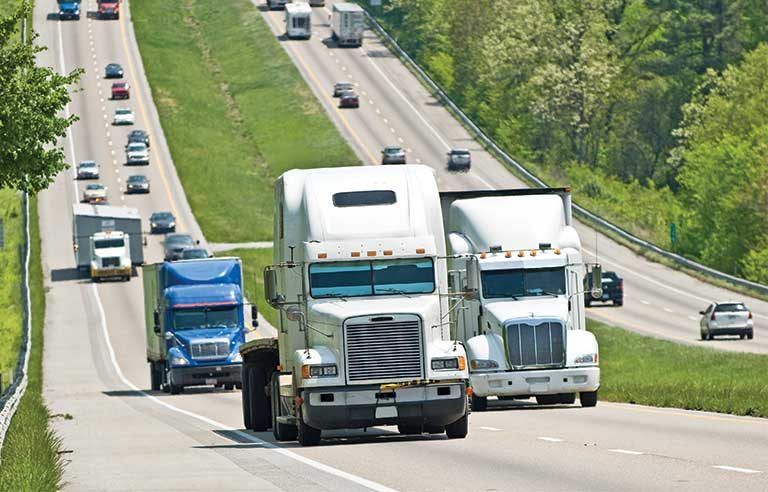Lawmakers introduce bill calling for speed limiters, set at 65 mph, on all new large trucks

Washington — Bipartisan legislation recently introduced in the Senate is aimed at limiting the speed of heavy commercial trucks to 65 mph by requiring new trucks to be equipped with speed-limiting devices.
Introduced June 27 by Sens. Johnny Isakson (R-GA) and Chris Coons (D-DE), the Cullum Owings Large Truck Safe Operating Speed Act of 2019 (S. 2003) would direct the secretary of transportation to promulgate standards and regulations requiring speed limiters on all new trucks heavier than 26,000 pounds, and would extend the maximum speed requirement to trucks that already have the technology installed. Older trucks without the devices would not be required to be retroactively fitted.
The bill is named in honor of Owings, a 22-year-old who was killed after a tractor-trailer rear-ended his vehicle while he was returning to college after the Thanksgiving holiday in 2002. It would codify a pending speed limiter rule that has “languished in the federal bureaucratic process for 10 years,” a June 27 press release from Isakson’s office states. The Department of Transportation, during the first days of the Trump administration, indefinitely delayed action on a proposed speed limiter rule, according to a June 28 Associated Press report.
“This legislation would officially enforce a long-awaited speed limit of 65 mph on large trucks and reduce the number of preventable fatalities on our busy roadways,” Isakson said in the release. “The majority of trucks on our roads already have speed-limiting technology built in, and the rest of the technologically advanced world has already put them to use to ensure drivers follow safe speeds.”
The Alexandria, VA-based Truckload Carriers Association, which represents dry van, refrigerated, flatbed and intermodal container carriers throughout North America, voiced its support for the bill in a July 10 press release.
“As an association which represents roughly 78% of freight market share by revenue, it is fair to say that any rule regarding speed limiters will have the greatest effect on our segment of the trucking industry,” the association states in the release. “TCA and our members recognize that traveling too fast for conditions is one of the most prominent reasons for accidents on our roads today. We have a safety obligation to responsibly operate our vehicles at speeds in which we can effectively control and limit the opportunity for accidents.”
In contrast, the Owner-Operator Independent Drivers Association released a video in 2017 opposing speed limiters in large trucks, citing concerns about higher crash rates, congested highways and increased pressure on drivers to make up for lost time when encountering inclement weather.
A position statement on the OOIDA Foundation website states that speed limiters “would decrease overall highway safety because the interaction between large trucks and passenger vehicles would increase. The greater a driver deviates from the average speed, the greater his chances of being involved in an accident.”
Post a comment to this article
Safety+Health welcomes comments that promote respectful dialogue. Please stay on topic. Comments that contain personal attacks, profanity or abusive language – or those aggressively promoting products or services – will be removed. We reserve the right to determine which comments violate our comment policy. (Anonymous comments are welcome; merely skip the “name” field in the comment box. An email address is required but will not be included with your comment.)

